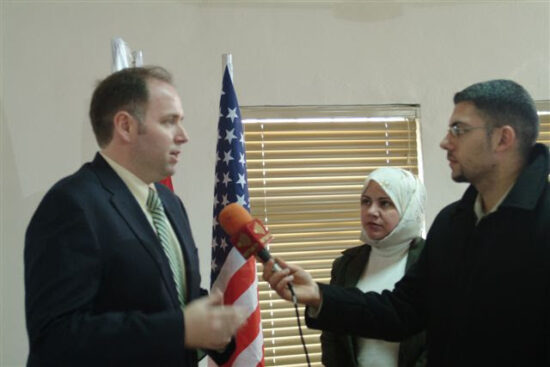By Ali Baskey, Co-Deputy Director, Office of International Visitors, U.S. Department of State

Ali is interviewed by a Palestinian journalist in Ramallah, Palestinian Territories in 2009. Credit: Ali Baskey
In April 2008, I arrived in Jerusalem to take on the Exchanges Officer portfolio at the U.S. Consulate General, which at the time was our principal representation to the Palestinian Authority. This was my third Foreign Service assignment, but my first as a Public Diplomacy Officer, and I was excited to foster engagement between Americans and Palestinians while supporting U.S. foreign policy priorities through programs such as the International Visitor Leadership Program (IVLP), Kennedy-Lugar Youth Exchange & Study (YES), Fulbright, and others. It was my good fortune to walk into an already well-honed IVLP operation in Jerusalem thanks to the efforts of our local staff at the Consulate General and the collaboration of our IVLP Network colleagues back in the United States.
Within weeks of my arrival, however, we were forced to overhaul our procedures when we learned that our Palestinian exchange program participants from the Gaza Strip (“Gaza”) would not be allowed to exit the territory through either of its crossings into Egypt or Israel. This was the result of both countries’ security concerns related to the Hamas terrorist group’s armed seizure of Gaza in June 2007.
One option – the easier option – would have been to cancel all exchange programs involving Palestinian participants from Gaza. We chose the harder route. Working in concert with our embassies to Israel and Jordan, we negotiated an arrangement that enabled diplomats from the Consulate General to escort our exchange program participants from the crossing point out of Gaza, across Israeli territory and the West Bank, and into Jordan for their onward travel to the United States. Given the unpredictable nature of the situation, we were ever grateful for the flexibility of our programming partners in the United States who never failed to accommodate the often fluid travel plans of our participants from Gaza.
The result of this effort is that hundreds of Palestinians from Gaza have been able to travel to the United States on exchange programs. The vast majority of these have been international visitors. Many of my diplomatic colleagues at the Consulate General relished the opportunity to escort those whom they had nominated for the IVLP on their half-day journey from Gaza to Jordan as it was a rare opportunity to glean their candid insights into the political, economic, and social situation inside Gaza, where U.S. diplomats were prohibited from traveling.
These relationships proved critical in addressing a significant foreign policy challenge in early 2009. In response to rocket fire on Israeli communities, the Israel military launched an operation against Hamas inside Gaza. Operation “Cast Lead” lasted three weeks as the Israeli military sought to remove the threat of further rocket attacks. The Consulate General took the lead on reporting on the situation inside Gaza, and relied extensively on our many IVLP alumni there to provide objective assessments of humanitarian conditions including medical access, food and water, and electricity. The resulting reports from these eye-witnesses were sent to the State Department and were influential in reaching a ceasefire and avoiding a protracted conflict.
This experience early in my career was a signal lesson in why we must continue to forge and nurture connections with foreign contacts through our exchange programs, despite what may seem insurmountable obstacles in times of crisis. Today we are faced with a different challenge, this one global and medical in nature, compelling us to innovate and conceive of new methods to deliver the IVLP experience virtually. Though the ability to travel during this pandemic may be greatly restricted, nonetheless our efforts to connect with foreign audiences by any available means remain as crucial as ever, and will pay dividends now and in the future in fostering mutual understanding and supporting U.S. foreign policy.
